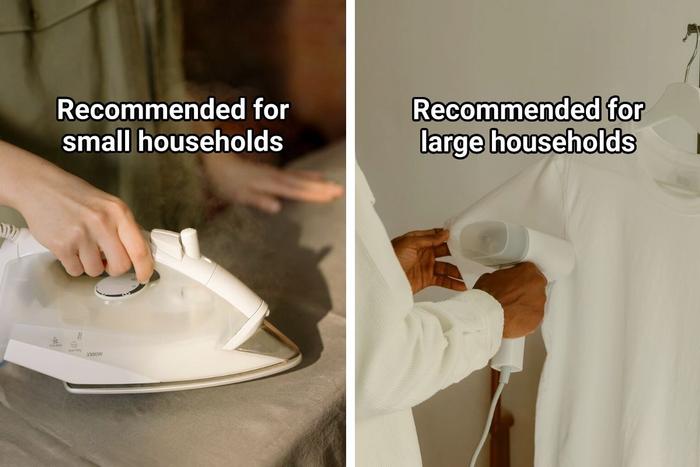Clear that ironing pile, stat.

But ironing can take really long when you’re trying to get those stubborn wrinkles out or press the perfect pleat. Whether you find it therapeutic or plain loathsome, you can make the process a smoother one with an iron that matches your needs.
Read on for what you should consider before buying an iron – and stick around until the end for a neat summary!
Know your iron types
1. Dry iron – traditional, inexpensive option

Source: Vecteezy
This iron is the traditional choice and it relies on dry heat, which comes from heating up the soleplate, to get the job done.
| Pros | Cons |
|
|

View this project by Inizio Atelier
Do note that you’d need more elbow/wrist strength to iron out the tougher wrinkles when you’re using a lighter dry iron – and if you have a mountain of laundry, no doubt your hands will get tired.
If you regularly iron thicker clothes (like wool and denim) and stubborn creases, a heavyweight dry iron will have the best results.
Recommended if:
- You’re looking for a no-frills, easy-to-use option
2. Steam iron – inexpensive option that does the job

Source: Unsplash
Unlike dry irons, steam irons have built-in water tanks – the water gets heated up and emitted as steam through the holes in the soleplate. You’ll find that removing creases is a lot easier when steam is involved.
| Pros | Cons |
|
|

View this project by Aart Boxx Interior
When you turn down the heat of a steam iron for silk and synthetic clothes, it’s not hot enough to produce steam so you might end up with water dripping on your clothes.
To prevent this, look for anti-drip functions. You boost your safety too, since it stops water from getting near an electrical source.
Recommended if:
- You want a budget-friendly option to remove wrinkles and get a crisp finish for clothes
- You iron regularly for yourself or a small family of 2 to 3
3. Steam generator iron – for heavy duty ironing

Source: Unsplash
Unlike a steam iron, a steam generator iron is connected to a separate tank/boiler generating steam continuously at high pressure.
| Pros | Cons |
|
|

View this project by Insight.Out Studio
If you don’t clean your steam iron or steam generator iron, you’ll find calcium deposits building up in the steam holes, leaving chalky white stains on your clothes. To prevent this, look for those with self-cleaning mechanisms because they remove scale and impurities in your iron and prevent rusting.
Recommended if:
- You regularly iron for a large family of 4 or more – you can clear large piles of laundry faster
- You are more experienced in ironing; these irons are hotter and produce more steam, so they may be more difficult to handle
4. Garment steamer – shortens ironing time

View this project by Swiss Interior Design
A garment steamer is designed to quickly de-wrinkle clothes after you put them on hangers, so you can use them vertically without pulling out an ironing board. That also cuts out time you’d need to maintain one (yes, ironing boards need some TLC too!).
For delicate fabrics or casual wear, it definitely does the job quicker.

Source: Unsplash
| Pros | Cons |
|
|
Garment steamers have a large water tank at the base with capacities usually ranging from 1 to 2.5litres, so you can iron more clothes.
They usually come with hanging equipment, like a built-in clothes hanger. You should also look out for wheels at the base to easily move it around the house.
Recommended if:
- You have a lot of steam-friendly garments in your closet
- You frequently iron large quantities of clothes for a family of 3 to 4
Want a lite version of the garment steamer for quickly smoothing out a few pieces when you’re in a rush, or travelling? Get a portable one: It’s compact, typically with less than 200ml tank capacity.
Other important considerations for buying an iron
With that covered, we’ll take you through other factors you should weigh before making your choice.

View this project by Mr Designer Studio
Ergonomics and weight: A good combination of an ergonomic handle and weight that works for you (and your garments) helps to avoid discomfort.
Wattage: A high-wattage iron heats up quicker than a low-wattage one and maintains higher steam pressure so you can remove creases effectively and quickly; 2000 watts will suffice for regular household use.
Soleplate material: We recommend stainless steel or ceramic soleplates because they are durable, have a smooth glide and are easier to clean. Keep in mind, however, that ceramic soleplates wear down faster since the ceramic is a coating.
Safety features: You can never be too careful while ironing, especially if you have young children around who are prone to mischief. Get an iron with an automatic shut-off function that will turn it off when left untouched.
Cord length: A long cord will let you manoeuvre comfortably around the ironing board, or cover all parts of your garments if you’re using a steamer.
Some steam iron models are cordless, so they’re convenient to use and you can set them up anywhere. On the other hand, the charging bases can be bulky and the irons may lose heat between strokes, meaning you have to recharge frequently and spend more time ironing.
Added features
There are plenty of other promising features worth looking into that will make ironing easier depending on your needs, but will likely bump up the cost of the irons you’re considering.

View this project by SG Interior KJ
Smart functions: Some irons come with smart sensors that automatically adjust temperature and steam output upon detecting what you are ironing.
Fabric care settings: Conversely, if you want to save on the cost and prefer to manually adjust settings to protect delicate fabrics, look out for fabric care settings with automatic safeguards against burns and damage to your clothes.
Depending on the type of iron you want and the features it’s equipped with, prices vary: Typically, dry irons cap at about $100 while steam generator irons can go as high as $2000.
We’ve dug deep in this article to help you make the most informed choice possible – but just so you have something to refer to at a glance when you’re shopping for a new iron, check out this nifty summary!

Stay up to date with the latest trends – follow us on Telegram! 🙌

 Get a budget estimate before meeting IDs
Get a budget estimate before meeting IDs